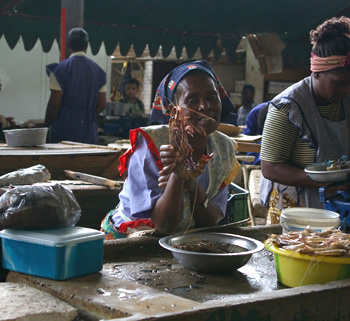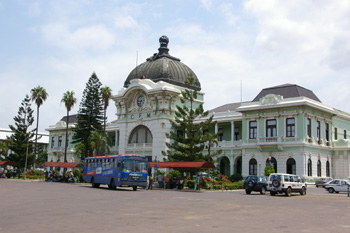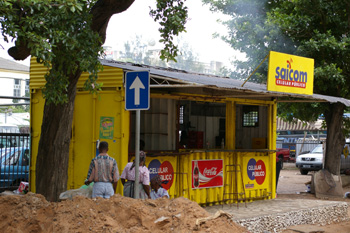
As advertised, the seafood is excellent.

The colonial archiecture (and for that matter the relaxed friendliness of the people) is Portuguese. A beer costs about 25p,

and Brian is right.
(Actually, there is a book to be written on why mobile phones and their applications in Africa have evolved differently than mobile phones in the rest of the world, and the biggest things (besides their being so useful) is the lack of legacy. That means legacy in terms of business methods as much as legacy in terms of technology. In Europe and (paritcularly) America, mobile phones networks are run by the same old telecommunications businesses as were traditional phones, and these companies are both terribly bad at retail and figruring out what customers want rather than just telling them what they should want. Plus they are far too busy trying to protect their existing business (including their existing mobille phone businesses) to want to innovate, and sometimes they will actively oppose innovation. Africa is much more a matter of “Try and see what works”, and that really works. But I digress).
I was in Johannesburg for a few days before coming here, and while the northern suburbs of that city have all modern amenities and in many ways feel like modern American suburbia around a couple of Edge Cities, every building and business in that city is fortified in a way that is not normal elsehwere. It is a dangerous city, and that influences the way that people go about every moment of their lives.
Maputo is not like that. Walking down the street there is no air of threat whatsoever. I feel perfectly safe walking down the street with my digital SLR around my neck and using my iPod, which I certainly would not in Johannesburg. Occasionally people try to sell you things fairly aggressively, but they are simply trying to sell you things.There is no implied threat whatsoever. By the standards of the thirld world this is a very relaxed place. So far I am enjoying it very much.




Michael,
The title of this piece reminds me of a telegram the famously absent-minded GK Chesterton once sent to his wife:
“Am at Market Harborough, where ought I to be?”
Otherwise, nice piccies.
GK Chesterton
Well, that’s a nice person to be compared to.
9 parentheses in one paragraph. Not bad at all.
Looks great, though – enjoy!
…every building and business in that city is fortified in a way that is not normal elsehwere.
More information, please.
as fenced off or walled off with electric wires on top. That’s not normal! Even shopping centres are fenced off around the perimeter of parking lot.
When I was in Maputo a while ago, therer were advertising on street poles were for Vodacom, a South African cellphone company.
Prawns are one of the best to be had in Maputo indeed.
And departing from Maputo airport is quite an experience itself.
“Occasionally people try to sell you things fairly aggressively” – bit of an understatement, I find them painfully persistent. I get the feeling they almost want me to pay them to go away.
As for Maputo, the part of the city along the coast is fairly quaint, but inland it reminds me of every other African city (except S Africa) – a sense of dirt and decay.
I get the feeling they almost want me to pay them to go away.
Oh yes, there is a point where it does switch from sales to harassment, and they have crossed this with me a few times. A certain amount of verbal aggression can be necessary to get rid of them, and although I don’t like doing this, once in a while I do.
However, I have encountered far worse, both elsewhere in Africa and in Asia. Try walking town the lower half of Nanjing Road in Shanghai some time.
Nice picture of the Polana Hotel. I wonder if it is still called that. Used to be a famous landmark of Lourenco Marques.
JR
If you are actually referring to my second picture, that is not the Polana Hotel but the main railway station.
This is the Polana Hotel.
Apparently it became rather run down during the war, but in recent years it has been restored to its former glory. It is the nicest hotel in town, and a lovely building, but I didn’t stay there because I didn’t want to spend too much money. I stayed at the Monte Carlo, which is much cheaper but is still a very nice hotel.
You have not been searching in the right places. There has been a great deal of research in Africa on mobile phone usage generally and on the use of mobile phones for advocacy, activism, general information provision, health care, election monitoring, in conjunction with radio broadcasting and education and recently in Kenya they have been used to report acts of violence directly via sms messaging to an internet website created to receive the SMS using Frontline sms. Admittedly there has been little in the mainstream media in African countries but the alternative media, NGOs, civil society organisations, social movements and bloggers have all written about mobile phone usuage in Africa. Check my blog under technology, whiteafrican.com, kiwanjinet and various groups on Facebook: Frontline sms supporters group; social mobile group; kabissa group and kabissa website to name just a few for starters.